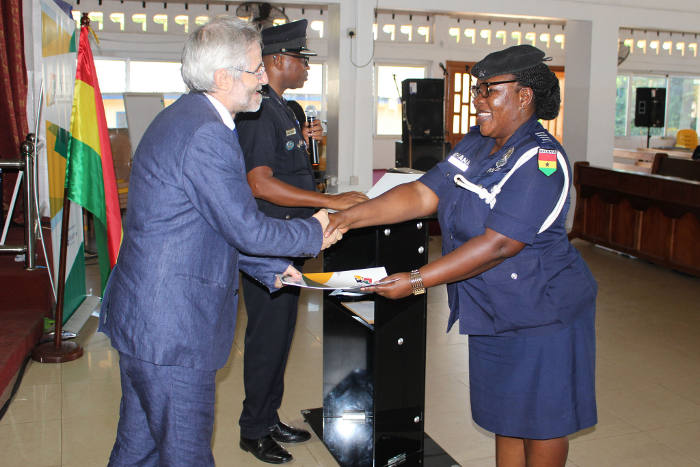-
11 October 2018
Category : Opinion
Corruption as a burden on progress: the example of Ghana
The Accountability, Rule of Law and Anti-Corruption Programme, managed by the FIIAPP in Ghana, supports the fight against corruption in the African country
 Image of an ARAP project activity
Image of an ARAP project activityEarlier this year, the World Bank published its forecast for global economic growth for 2018, a forecast that featured Africa prominently. With an estimated growth of 8.3%,Ghana led a ranking in which sub-Saharan countries held the top positions. In addition to Ghana, Ethiopia (2nd), Ivory Coast (4th) and Djibouti (5th) were among the five countries with the highest growth forecasts. This aspect of the Ghanaian economy does not come as a surprise. With 34 years of uninterrupted growth (the last recession dates from 1983, when its economy shrunk by 4.5%), Ghana has one of the most diverse and dynamic economies in sub-Saharan Africa—the eighth largest in terms of GDP and the second largest in West Africa after Nigeria—and has a fairly balanced trade balance, which places it as a low-middle income country.
Inequality versus macroeconomics
However, these macroeconomic data cannot hide other indicators that are not so encouraging. Although the population living in extreme poverty has halved in the last 25 years, from 52% in 1992 to 24% today, Ghana is one of the 50 most unequal countries in the world and, as Oxfam points out in its latest reports, “inequality [in Ghana] is increasing, undermining the reduction of poverty, slowing economic growth and threatening social stability.” According to data from this NGO, in Ghana the 10% of the richest population consumes almost a third of the resources (32%), the same amount consumed by the poorest 60%. At the other end of the scale, the poorest 10% only has access to 2% of the resources.
This problem is compounded by two important gaps. In the first place, the gender gap, which causes women to have very restricted access to resources and wealth. As Oxfam points out, this group is “half as likely as men to own land”. In addition, “only 6% of the richest people in Ghana are women”. Second, there is a territorial gap. Ghana’s development pattern has accentuated the north/south and country/city divisions, with poverty fundamentally located in rural areas (almost four times more than in urban areas); and in the three northern provinces (the Upper East, Upper West and Northern regions), which have development indicators similar to countries such as Mauritania, Madagascar or Benin, according to the 2015 Human Development Report.
Regiones de Ghana de menor a mayor IDH y país equivalente Región IDH País equivalente Northern 0,483 Benín Upper West 0,506 Madagascar Upper East 0,508 Mauritania Central 0,535 Angola Brong Ahafo 0,571 Santo Tome y Príncipe Eastern 0,575 Santo Tome y Príncipe Ghana (nacional) 0,578 – Volta 0,581 Zambia Ashanti 0,588 Laos Western 0,609 Bután Greater Accra 0,647 Marruecos Fuente: Subnational Human Development Index de Global Data Lab Anti-corruption in the face of inequality
To enable government action in countries affected by inequality to reverse the situation, emphasis should be placed on three aspects, as indicated in the Commitment to Reducing Inequality Index: social spending, tax policies and workers’ rights, and corruption is a phenomenon that negatively impacts these three aspects. Firstly, by detracting from public resources, corruption significantly affects social policies, which have less spending capacity. Secondly, since it is an opaque economic circuit, it is not taxed. In addition, on many occasions, large-scale corruption and tax evasion are interconnected phenomena that involve political and economic elites. Without forgetting that the social perception of corruption is a great disincentive for compliance with tax obligations by citizens, who think that their taxes will end up in the pockets of the rulers. Lastly, corruption encourages informal employment, where it is more difficult to adopt regulations that promote respect for workers’ rights and the establishment of decent minimum wages.
In short, as Transparency International pointed out in the presentation of the Corruption Perception Index 2016, “systemic corruption and social inequality reinforce each other, creating a vicious circle between corruption, unequal distribution of power in society and unequal distribution of wealth”. This is exactly what happens in Ghana. The perception of corruption in the country, measured by the aforementioned index, yields a medium-high score of 40 out of 100. This index indicates the degree of corruption in the public sector according to the perception of the business sector and country analysts, on a scale from 100 (perception of absence of corruption) and 0 (perception as very corrupt). But there is a more alarming fact, namely that Ghana´s result has been deteriorating in recent years, from 48/100 in 2014 to 40/100 in 2017. Quite probably, this worsening is largely due to the revelation in recent years of important corruption cases that affected the judicial system and the football federation.
Tax evasion, which, as we pointed out, is a matter closely linked to corruption, is also an important challenge for Ghana. In fact, for Ghana’s Business Development Minister, it is the biggest challenge the country faces. All of this means that the fight against corruption in Ghana is a powerful tool for inclusive development, which goes beyond mere macroeconomic growth and considers the most disadvantaged groups. And that is the goal of Ghana’s Accountability, Rule of Law and Anti-Corruption Programme (ARAP), which is managed by the FIIAPP in Ghana with funding from the European Commission: to reduce corruption and improve accountability in this African country. This project begins at a time when the government of Ghana has been intensely involved in the fight against corruption, creating Ghana´s National Anti-Corruption Action Plan (NACAP) within which the project is framed.
Ángel González, technical coordinator of the transparency and anti-corruption support project in Ghana
The views and opinions expressed in this blog are the sole responsibility of the person who write them.






